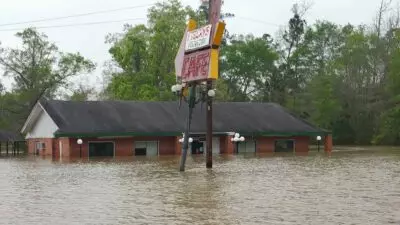The federal government is deploying more manpower on several fronts to East Palestine in the coming days as scrutiny intensifies over Norfolk Southern’s catastrophic train derailment and ensuing chemical fire.

A new medical clinic equipped with Washington’s top chemical exposure experts is set to open as soon as Monday to assist residents who fear for their health following the fiery release of toxic substances into their air, water, and soil.
Despite assertions by state officials that initial testing shows municipal water and local air quality remains safe, residents across the village of nearly 5,000 people near the Pennsylvania-Ohio border have reported anecdotal cases of developing headaches, rashes, nausea, itchy eyes, and other symptoms.
“They might have a headache, and they might ask themselves, ‘Is this (just) a headache — or is this a headache that is, in fact, caused by the train derailment?’” Ohio Gov. Mike DeWine said as he announced the clinic, which will be run by Ohio public health officials in coordination with the U.S. Department of Health and Human Services.
“These are very legitimate questions. Residents deserve an answer. They have suffered a great deal, this has been a traumatic time for them.”
In a reverse move, the Federal Emergency Management Agency pledged late Friday to send representatives to assist in the massive cleanup. As recently as that morning, FEMA had denied DeWine’s request for aid because a train derailment doesn’t fall under the relief agency’s typical purview of disasters, like tornadoes and hurricanes.
EPA updates — East Palestine Train Derailment
EPA Information Line: 215-814-2400
EPA’s East Palestine information line is open from 8 a.m to 8 p.m. (Eastern Time).
Epidemiologists with the Centers for Disease Control and Prevention are working alongside state public health officials and local medical providers. The federal Environmental Protection Agency is collaborating with the Ohio EPA and independent contractors to collect water samples from private wells, which have not yet been cleared via testing.
Residents who rely on them are urged by DeWine and public health officials to drink bottled water until the results get back “out of an abundance of caution.”
On Thursday, the Pennsylvania Senate will hear testimony from affected residents – and seek answers from Norfolk Southern officials – during a legislative committee hearing scheduled at the Community College of Beaver County.
It’s unclear if the railroad operator has confirmed that its representatives will attend the forum. Last week, DeWine rebuked Norfolk Southern for refusing to participate in the Feb. 15 town hall held in East Palestine, with the railroad operator citing concerns about threats against its employees.
Meanwhile, Pennsylvania Gov. Josh Shapiro sent a scathing Feb. 14 letter to Norfolk Southern CEO Alan Shaw, accusing the railroad operator of “creating confusion,” providing “inaccurate information” and failing “to explore all potential courses of action – including some that may have kept the rail line closed longer but could have resulted in a safer overall approach for first responders, residents, and the environment.”
“Our company will be working tirelessly every day to get East Palestine back on its feet as soon as possible,” Shaw, who has not responded directly to Shapiro’s letter, said Friday in a statement. “We know we will be judged by our actions, and we are taking this accountability and responsibility very seriously.
FEB. 14, 2023, TWEET FROM PA GOV. JOSH SHAPIRO
Earlier today, I met with leaders and legislators from Beaver County to discuss our shared concerns on the East Palestine train derailment and continue to coordinate our response. ⁰⁰Our Administration is working with partners to ensure Pennsylvania families are informed, safe,… pic.twitter.com/b0jjSYkq4b
— Governor Josh Shapiro (@GovernorShapiro) February 14, 2023
More than two weeks after the derailment, Norfolk Southern officials, as well as Ohio officials, are facing mounting criticism over the response — including whether the railroad operator followed proper emergency coordination protocols and sufficiently explored safer alternatives to the controlled release and burn of five hazardous tanks.
DeWine said that he stands by the call to proceed with the controlled release with input from the local fire chief. As temperatures climbed, the governor’s goal was to thwart a potential uncontrolled explosion that officials warned could have sent shrapnel flying as far as a mile.
“When I arrived there that morning, we had a long conversation trying to determine the risk of doing the controlled release versus the risk of doing nothing and waiting,” DeWine said Friday. “It was a balancing test.”
The burned tanks were carrying vinyl chloride, a chemical used to make PVC pipes whose inhalation can be deadly and long-term exposure is linked to increased risk of liver, brain, and lung cancers. Experts say that the controlled burn could have further unleashed dangerous dioxins, which can cause cancer as well as reproductive and immune system problems.
The fiery wreck’s aftermath has prompted renewed calls to strengthen regulations and safety rules governing rail transportation nationwide, including by reviving pieces of proposals nixed during both the Trump and Obama administrations after lobbyists railed against costly changes. Two notable included equipping more trains with electronic pneumatic brakes, and classifying trains that carry chemicals such as vinyl chloride as high-hazard flammable trains.
“We’re calling on state and federal officials to protect public health in our communities by subjecting freight companies such as Norfolk Southern to greater levels of inspections and oversight,” David Masur, executive director of the nonprofit PennEnvironment, said in a statement. “We need to update and improve America’s ailing rail infrastructure and train companies need to get proper insurance policies to cover the cost of an oil train disaster and safety violation fines.”
Calls to action also are mounting from Republican and Democratic lawmakers — including all four Ohio and Pennsylvania U.S. senators — to re-examine rail safety rules and mechanisms that could thwart derailments, or at least minimize the severity of the incidents by preventing chemical release and explosions.
“The NTSB’s independent investigation to determine probable causes of the East Palestine derailment is critical to preventing future derailments involving hazardous materials in Ohio and Pennsylvania, as well as across the nation,” U.S. Sens. Sherrod Brown, J.D. Vance, Bob Casey, and John Fetterman wrote in a joint letter to the National Transportation Safety Board, which plans to release its investigative report on the incident in early to mid-March.
“We need to update and improve America’s ailing rail infrastructure and train companies need to get proper insurance policies to cover the cost of an oil train disaster and safety violation fines.” — David Masur, executive director of the nonprofit PennEnvironment
In East Palestine’s case, however, it’s not clear whether any particular safety measure or rule change would have outright prevented the derailment itself, according to initial reports from the NTSB and industry experts.
For instance, despite widespread concerns over the rail industry slashing payrolls, it’s unlikely that bolstering inspection and staffing could have thwarted the East Palestine train derailing off the tracks, according to Allan Zarembski, director of the rail engineering and safety program at the University of Delaware.
Preliminary reports by the NTSB attribute the mechanical failure to an overheated wheel bearing.
“There’s no way any inspectors anywhere in the world would have found this (issue),” Zarembski said. “This was some sort of degradation of a sealed bearing where you can’t look inside the bearing, and my understanding was it was within the lifespan of the bearing, but it was one of those very rare occurrences where something degraded internally in the bearing and that caused the bearing to generate excess heat and ultimately burn off.”
The roughly 150-car train carried everything from frozen vegetables, malt liquor, and cotton balls. There are maybe a dozen to 15 derailments a year due to overheated bearings.
Most derailments do not have major consequences, such as the Norfolk Southern train that derailed without any injuries or Hazmat problems Thursday in Van Buren, Mich., about 30 miles west of downtown Detroit.
The Association of American Railroads reports that of more than 2.6 million carloads containing hazardous materials transported in North America last year, 99.9% arrived at their destinations without incident.
“The danger you’re most concerned about is not the derailments — it’s the derailment with the explosion or the release of hazardous materials,” Zarembski said. “But those are very, very rare events — You’re talking about maybe 10 of them a year across the entire United States, and a lot of them are significantly less in magnitude than this one.”
Of about 1,600 derailments last year, 11 resulted in a hazardous materials breach, federal records show. More than half to 65% of such incidents tend to be minor, slow-moving derailments that happen in railyards — what Zarembski describes as the rail equivalent of a “fender bender.” A derailment must be reported if it causes at least $13,000 in damage.
Support more work like this from Postindustrial Media by becoming part of our community — click here!







